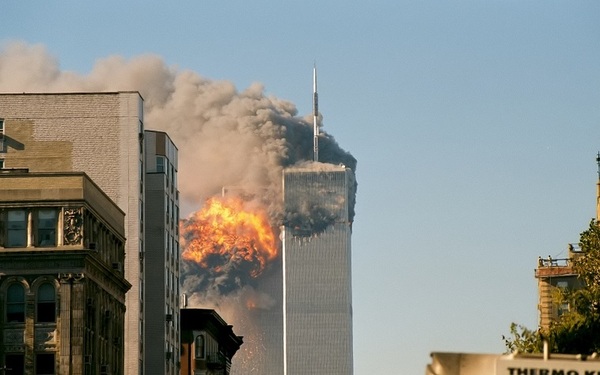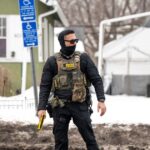
–>
January 10, 2023
On the night of 9/12/2001, my phone was ringing as I walked in the door after two days on standby at my fire department. I was an Ashburn, VA firefighter/EMT. We had sent one fire truck and ambulance already to the Pentagon that terrible morning of 9/11; I was on the second engine crew waiting to respond. All that day and night and the next day we watched the TV coverage of the attack on the Towers in New York and on the Pentagon, and the crash in Pennsylvania. The night after the plane flew into the Pentagon, it was declared a recovery and we were stood down.
‘); googletag.cmd.push(function () { googletag.display(‘div-gpt-ad-1609268089992-0’); }); }
On the phone was a woman who boarded a horse with me. She complained that she’d been trying to call me for two days, said she knew I had connections in Washington, and that I must stop President Bush from reacting violently to the events of the previous day. I was stunned. Later I learned that she and her husband were Quakers.
Libertarians and pacifists have something in common: They don’t want to engage in overseas wars. There the comparison pretty much stops. Quakers don’t want any war anywhere anytime. Noble sentiment. Nor do any good people of sound mind, including and especially warfighters. Libertarians are not antiwar, they’re for war if our country is invaded, but only if our country is invaded, and only on our own territory.
There’s a big problem with that philosophy, but I’ll get to that in a minute.
‘); googletag.cmd.push(function () { googletag.display(‘div-gpt-ad-1609270365559-0’); }); }
A few days after the 9/11 attack, I got summoned to a meeting in a military association headquarters in Washington. Cato Institute wanted to meet with leadership of conservative/military organizations, so half a dozen of us met with the two Libertarian intellectuals. The Cato men argued that the United States absolutely must not respond to the terrorist attacks on 9/11. Not one U.S. soldier, airman, sailor, or Marine on the ground, in the air or on the sea of a foreign shore. We had been invaded, yes, but the people who did it were dead. The end.
The problem with Libertarian war policy is that by the time an invading force gets to the territorial U.S., countless people elsewhere have been killed or displaced, their countries devastated. There’s nobody left to help us, and now it’s our turn to die or be displaced, our own country to be devastated by war. And where would our refugees go? As President Reagan said, America is the last best hope for mankind.
Woodrow Wilson (WWI) and FDR (WWII) campaigned on the promise that they would not “send your sons to war.” Lyndon B. Johnson (Vietnam) swore in his 1964 presidential campaign, “We are not about to send American boys nine or ten thousand miles away from home to do what Asian boys ought to be doing for themselves.”
President Joe Biden has made clear that the U.S., despite promises made in the 1994 Budapest Memorandum, American troops will not be sent to the war in Ukraine. (Except for Biden’s telling 82d Airborne troops in Poland that they would soon see the war in Ukraine for themselves.)
 We do go to war on foreign shores, but after our allies-to-be were bled white with the enemy in control of Europe in the cases of World War I, and both Europe and Asia in the case of WWII. How much sooner would those wars have ended had America joined the fight at the outset? How much blood and treasure would have been saved?
We do go to war on foreign shores, but after our allies-to-be were bled white with the enemy in control of Europe in the cases of World War I, and both Europe and Asia in the case of WWII. How much sooner would those wars have ended had America joined the fight at the outset? How much blood and treasure would have been saved?
Truman’s response to Korea was timely, but with insufficient and untrained, poorly armed and badly equipped occupation troops stationed in Japan. Vietnam should never have been our war, and was criminally mismanaged by politicians and bureaucrats in Washington. Afghanistan and Iraq I & II are the definition of “just war.” We (or our national interests in Gulf One) were attacked, and we responded, going after the enemy on his home ground.
‘); googletag.cmd.push(function () { googletag.display(‘div-gpt-ad-1609268078422-0’); }); } if (publir_show_ads) { document.write(“
In our interests, cold rationalism says that it is better to fight a war somewhere else rather than in our own land, on our own streets. That sounds callous, but the war is already on elsewhere, and the enemy must be contained as quickly as possible where he is, and defeated decisively. It won’t help the hapless victims over there if we wait for the enemy to crush them before moving on to our own shores. It’s a case of feeding the crocodile in the hopes it will eat you last, to paraphrase Churchill.
Most wars could be prevented by fearlessly decisive action at the first move of an aggressor, or by preemption. Hitler admitted that the West could have stopped his war plans dead in their tracks over Sudetenland. But we didn’t.
Deterrence is even better. Igitur qui desiderat pacem, praeparet bellum. “If you desire peace, prepare for war.” (Vegetius, Roman general)
In the American system of government, elected politicians must make the decision to go to war. They must set the broad parameters, right or wrong, as Truman did in Korea. But then they must allow the military to fight to win an absolute victory. If they do not, more war is inevitable. In WWII we had total victory, and our former enemies are our allies now. In WWI we had an armistice — a ceasefire. It led to WWII twenty years later. We did not achieve a victory in Korea — we signed a ceasefire that can explode into war again at any time. LBJ and Robert Strange McNamara, his Secretary of Defense, had no intention to winning the Vietnam War, only not to lose it under their watch. American involvement ended in a cut and run after the pernicious Paris Peace Accords ignominiously ended American involvement in the war and abandoned those Vietnamese, Hmong, Montagnard, Cambodian, and Lao allies who had trusted us to their terrible fates. And then there’s Afghanistan, Biden’s treacherous abandonment of people and assets.
If Putin crushes Ukraine, he will not stop there — history tells us that the crocodile will only have had another appetizer. His appetite has already been whetted with Georgia, Crimea, and Chechnya. The U.S., UK, and, ironically, Russia guaranteed Ukraine’s security and sovereignty. Russia’s definition of the guarantee, of course, is not the same as that of American, British, and Ukrainian understanding. Will we stalwartly stand by those guarantees? Will our resolve be unwavering?
Apologists argue that Russia needs and has a right to a “buffer.” That buffer, like the universe, is ever-expanding. Maybe it will stop when it reaches the seas. Even now, Russia is expanding its Arctic strategic zone and its military infrastructure.
Our politicians — POTUS and Congress — must decide whether to wait for a new world war or to do whatever is necessary to stop Putin right there and now, and destroy his ability to make aggressive war. Our leadership, unfortunately, will not want to have to make that hard decision. They’d rather obsess over climate change and pronouns, and then be surprised when war demands our participation.
War is looking for us, and if it finds us, it likely will find us with our pants down again.
Image: Robert J. Fisch
<!– if(page_width_onload <= 479) { document.write("
“); googletag.cmd.push(function() { googletag.display(‘div-gpt-ad-1345489840937-4’); }); } –> If you experience technical problems, please write to [email protected]
FOLLOW US ON
<!–
–>
<!– _qoptions={ qacct:”p-9bKF-NgTuSFM6″ }; ![]() –> <!—-> <!– var addthis_share = { email_template: “new_template” } –>
–> <!—-> <!– var addthis_share = { email_template: “new_template” } –>







